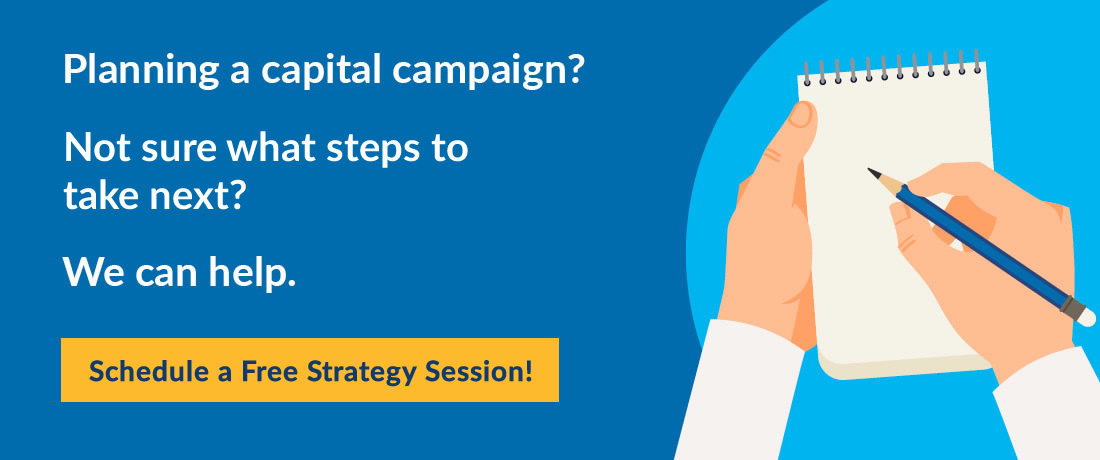How to Recession-Proof Your Capital Campaign In Uncertain Times

“Should we start a capital campaign now? ”
That’s a question we get asked all the time. We often answer the question with another question:
“What’s the purpose of the capital campaign?”
Or, stated in another way — What do you need the funding for?
If the answer is compelling and urgent, then the time to start a campaign is right now — regardless of the economy. And regardless of who else in the community is conducting a campaign. And regardless of whatever else is going on in the world.
Want hands-on guidance from an expert as you weigh your fundraising options? Request your free strategy session today.
Is NOW Really a Good Time to Start a Campaign?
At the beginning of the pandemic in early 2020, we were asked many questions — especially, “Is now a good time to start a campaign?”
Now, more than two years later, the answer is crystal clear. Those who were brave and started or continued their campaigns in mid-2020 are finished (or nearly finished). Those who hesitated haven’t even started yet.
The Answer is Twofold
This may seem an odd answer, but it’s true. It’s never a good time to start a campaign and it’s always a good time to start a campaign.
It’s NEVER a good time because campaigns are big, scary, and often challenging.
And…
It’s ALWAYS a good time because…
- There will always be other campaign going on in the community.
- There will always be uncertainties in the economy and in the world.
- There will always be increasing construction costs.
- There will always be people who are hesitant to offer their support.
In other words, what are you waiting for? There is no perfect moment. There’s only the right moment for your organization.
As long as you have a big vision and a plan, the time is right for you right now.
Some Risk is Baked In
The reality is that during your campaign, which is likely to take three years to plan and execute, the economy will fluctuate. It’ll go up and it’ll go down. There’s likely to be an important election. There could be floods, fires, or earthquakes.
The point is, there is always some risk involved. But there are also ways to mitigate that risk.
Three Ways to Recession-Proof your Campaign
Regardless of what’s happening with the economy, here are three ways you can mitigate the risks that come with conducting a capital campaign.
1. Plan Well
Every campaign is a calculated risk. You can best mitigate the risk with a feasibility study.
Do not skip a feasibility study. Contrary to popular belief, a feasibility study does not tell you whether your campaign is possible (or feasible). It tells you HOW to do you campaign and creates the groundwork for a solid plan.
I cannot emphasize enough the benefits of a feasibility study for good campaign planning and execution. If you’ve been following our work for a while, you’ll know that we’ve developed a better feasibility study model — a Guided Feasibility Study — to help you prepare and plan for a successful campaign.
We strongly suggest that you consider a Guided Feasibility Study rather than sending a consultant out to interview your donors.
2. Stay in Touch with Your Donors
Let’s say you’ve planned well and forged ahead. The market takes another tumble.
Your number one priority is to get in touch with your leadership donors — those you’ve already solicited and who have pledged support. Ask them how they are feeling about the economy and if it could impact their gift. Ask them for their thoughts and guidance.
If necessary, shift the timing of the gifts. Ask them what they can commit to now and let them know you’d like to come back and revisit the topic when the economy recovers.
3. Adjust Your Campaign Plan as Needed
There are two ways to adjust your campaign plan as you proceed through a campaign, if it becomes necessary.
- Change the goal.
Even with the best planning, sometimes you simply can’t raise the money you had hoped you could raise. If that becomes the case mid-campaign, you will need to scale back your plans.This might mean not raising as much for your endowment as you had hoped. It might mean scaling back the parts of your building. You may also take a loan to cover some of the costs. This “plan B” will be part of your initial planning. - Change your timeline.
This does not mean you will extend the timeline of your campaign indefinitely. However, if you have reason to believe that an additional six to twelve months will provide you with the opportunity to solicit more donors or ask for an extended pledge period, it’s not a problem to extend the timeline.
Balancing Risk versus Reward
While you can never 100% recession-proof your campaign, there are specific steps you can take to mitigate the risks and deal with disappointing situations, should they come.
Keep in mind — if you are too risk-averse, you will always find an excuse to put off your campaign. And, as a result, you will never gain the opportunity to see what amazing things your organization can accomplish.
So don’t be afraid to take the plunge. Especially if you’re in good, experienced hands.




Leave a Comment